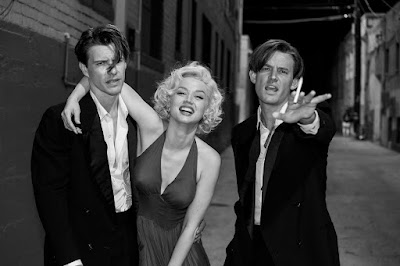 |
| Courtesy of Netflix |
After seeing the film (currently in limited theatrical
release before going to Netflix) co-produced by Brad Pitt’s production company
Plan B and factoring the experience of uncompromising confrontational
unpleasantries, I can confirm Blonde to be the saga of Marilyn Monroe
through the mournful lens of David Lynch’s Twin Peaks: Fire Walk with Me by
way of equally challenging and difficult hyperkinetic artworks such as Darren
Aronofsky’s Requiem for a Dream, Oliver Stone’s Natural Born Killers
or even Gaspar Noe’s Enter the Void.
Alas, here is a period piece about a familiar subject that
pushes the boundaries of what is seeable or hearable in a film, experimenting
wildly with innovative filmmaking and sound engineering techniques. Those who are looking for a straight-laced Netflix
biopic are likely going to be turned off while others more interested in
subverting conventions will have a field day.
Whether or not audiences at home will have the same experience as in
theaters, which felt increasingly like a frontal sensory assault, remains to be
seen. What unspooled in the theater
setting, however, was in its way kind of astonishing. There has never been a biopic of an
actor/actress quite like this before except maybe Paul Schrader’s Auto Focus
and given the noise made about Blonde before anyone got a real look at
Dominik’s film, it is unlikely we’ll see one like it ever again.
Much has been made of actress Ana de Armas who all but
completely inhabits every aspect of the role from the physicality to the
psychology of Marilyn Monroe. Though having
to reenact degradations experienced by the actress, including one particularly
unnerving scene with former president John F. Kennedy, de Armas IS Marilyn
Monroe. From her movements to the way
she speaks and carries herself to the bevy of innovative cinematographic
techniques employed by cinematographer Chayse Irvin, we are believably transported
into Monroe’s world and headspace which grows increasingly hallucinatory and
even bizarre as the forces of Old Hollywood evils close in around her.
Visually Blonde has the feel of experimental
filmmaking with a wide variety of cinematic invention including but not limited
to multiple aspect ratios, windowboxing, rapid-fire editing, frequent use of
the Snorricam where the camera apparatus is attached to de Armas’ body and the
subtle use of curved lenses to give certain shots a circular effect. Simply put, this is the most hyperactive
experimental piece of filmmaking of its kind since Aronofsky set moviegoers
loose into druggie Hell back in 2001.
Then there’s the soundtrack by Nick Cave and Warren Ellis which is
evocative, ethereal, haunted and finally ambient ala Angelo Badalamenti, again
fueling comparisons to the tonality of Lynch’s work.
Yes Blonde is like being in a Hell, an unmitigated
misery that just keeps spiraling downward into degradation and death. Whether or not it does right or wrong by
Monroe is open to debate but for my money, Blonde washes over the viewer
like a Tsunami, galvanizing and hurting you as it crashes into you, leaving you
feeling somewhat shaken, perhaps angry but ultimately cleansed. More than anything, it takes what we think we
know about Monroe and the conventions of the biopic and completely tears them
limb from limb in what is an evocative film experience that doesn’t attempt to
clear up our notions of who Marilyn Monroe was so much as it tries to bring us
a little bit closer to her fragile soul.
Not for most people, not to be enjoyed but as a piece of purely
audiovisual art, Blonde is breathtaking!
--Andrew Kotwicki





